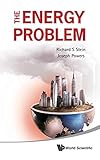The energy problem / Richard S. Stein and Joseph Powers.
Publication details: London: World Scientific, 2011.Description: xix, 188 p. : illISBN:- 9789814340311
- 333.794 Q11
| Item type | Current library | Call number | Status | Date due | Barcode | Item holds |
|---|---|---|---|---|---|---|
 Books
Books
|
Mahatma Gandhi University Library General Stacks | 333.794 Q11 (Browse shelf(Opens below)) | Available | 56273 |
Browsing Mahatma Gandhi University Library shelves, Shelving location: General Stacks Close shelf browser (Hides shelf browser)

|

|

|

|

|

|

|
||
| 333.791 6 Q0 Energy, the environment and climate change / | 333.793 8 Q2 Waste to energy: | 333.794 Q1 Handbook of renewable energy technology / | 333.794 Q11 The energy problem / | 333.794 Q2 Advanced renewable energy sources/ | 333.794 Q21 Renewable energy sources and climate change mitigation: | 333.794 Q3 Eco- and renewable energy materials / |
Includes bibliographical references and index.
Pt. 1, Basis: Energy Considerations: -- 1. Introduction: Is there a problem? ; Where does energy come from? ; Conservation of energy ; Where does gasoline get its energy? ; Fossil fuel sources ; The carbon dioxide problem -- 2. What to Do About It?: The possibilities ; Using less energy ; Lifestyle changes ; Food supply ; Transportation ; Conservation ; Alternative energy sources -- 3. Thermodynamics: The first law of thermodynamics ; Some examples of the first law ; The second law of thermodynamics ; A reflection -- 4. Conservation: The nature of conservation ; Change in the nature of housing ; Energy consuming devices ; Transportation ; Hybrids and fuel efficient cars ; Planes, buses, trucks, and trains ; Centralized agriculture ; Electrical power conservation ; Other factors that might be considered ; An overview of the conservation approach ; Considerations for bringing conservation about -- Pt. II, Present Energy Sources: -- 5. Fossil fuels ; Coal ; What about oil? ; Gasification of coal ; Natural gas as a fuel ; Synthetic oil ; Oil sands -- Pt. III, Alternative Energy Sources: -- 6. Alternative energy sources: The problem with fossil fuels ; The sun is the ultimate source of most energy ; "Blue-Sky" ideas -- 7. Biofuels: Why biofuels? ; Burning wood ; Biodiesel ; Alcohol as a biofuel ; The preparation of biofuels by pyrolysis ; Energy from trash ; Synthetic photosynthesis ; Hydrocarbons -- 8. Wind and Water: Wind power ; Hydroelectric power ; Tidal and wave energy -- 9. Geothermal: Hot springs ; Heat pumps -- 10. Solar Energy: The sun's energy -- 11. Nuclear Energy: Principles ; Nuclear reactions ; The future -- Pt. IV, Conclusions: -- Overview: Economics ; Timing ; Political considerations.
Most scientists now believe that carbon dioxide concentrations in the atmosphere are rapidly increasing, and that emissions from the burning of fossil fuels is a principal cause. Thus, it is probable that this will affect the climate and lead to global warming. This book familiarizes the non-specialist with alternative sources of energy, pointing out their advantages and disadvantages. The appropriate principles of physics and chemistry involved in each alternative will be presented in an easily digestible manner. The book seeks to better inform the public about specific actions that need to be taken in order to better combat energy problems, and reduce climate change. -- Back Cover


There are no comments on this title.